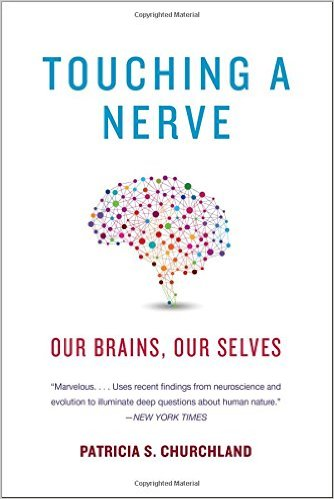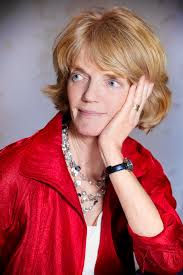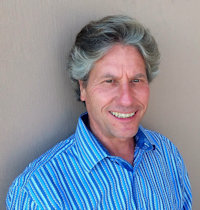Touching a Nerve - Our Brians, Our Selves

from amazon.com
A trailblazing philosopher’s exploration of the latest brain science—and its ethical and practical implications.
What happens when we accept that everything we feel and think stems not from an immaterial spirit but from electrical and chemical activity in our brains? In this thought-provoking narrative—drawn from professional expertise as well as personal life experiences—trailblazing neurophilosopher Patricia S. Churchland grounds the philosophy of mind in the essential ingredients of biology. She reflects with humor on how she came to harmonize science and philosophy, the mind and the brain, abstract ideals and daily life.
Offering lucid explanations of the neural workings that underlie identity, she reveals how the latest research into consciousness, memory, and free will can help us reexamine enduring philosophical, ethical, and spiritual questions: What shapes our personalities? How do we account for near-death experiences? How do we make decisions? And why do we feel empathy for others? Recent scientific discoveries also provide insights into a fascinating range of real-world dilemmas—for example, whether an adolescent can be held responsible for his actions and whether a patient in a coma can be considered a self.
Churchland appreciates that the brain-based understanding of the mind can unnerve even our greatest thinkers. At a conference she attended, a prominent philosopher cried out, “I hate the brain; I hate the brain!” But as Churchland shows, he need not feel this way. Accepting that our brains are the basis of who we are liberates us from the shackles of superstition. It allows us to take ourselves seriously as a product of evolved mechanisms, past experiences, and social influences. And it gives us hope that we can fix some grievous conditions, and when we cannot, we can at least understand them with compassion.
http://www.amazon.com/Patricia-S.-Churchland/e/B004QVSURY/ref=dp_byline_cont_pop_ebooks_1
Author: Patricia S. Churchland

from wikipedia
Patricia Smith Churchland (born July 16, 1943) is a Canadian-American analytical philosopher[3][4] noted for her contributions to neurophilosophy and the philosophy of mind. She is UC President's Professor of Philosophy Emerita at the University of California, San Diego (UCSD), where she has taught since 1984. She has also held an adjunct professorship at the Salk Institute for Biological Studies since 1989.[5] She is a member of the Board of Trustees Moscow Center for Consciousness Studies of Philosophy Department,Moscow State University.[6] In 2015, she was elected a Fellow of the American Academy of Arts & Sciences.[7] Educated at the University of British Columbia, the University of Pittsburgh, and the University of Oxford, she taught philosophy at the University of Manitoba from 1969 to 1984 and is married to the philosopher Paul Churchland.[8] The New Yorker magazine observed regarding the philosophical couple that, "Their work is so similar that they are sometimes discussed, in journals and books, as one person."
http://philosophyfaculty.ucsd.edu/faculty/pschurchland/index_hires.html
Reviewed by: John Stokdijk

Sleep… a fire quenched!
This phrase will live long in my mind, a mind often ablaze with a constant stream of racing thoughts. To be awake is to be conscious, fully alive. It is an awesome experience but one from which we need regular relief. Everyday we lose consciousness as we sleep. While asleep it is as if we ourselves no longer exist.
I am interested in neuroscience for a good reason. I am on a quest to understand myself as best I can. To understand myself I must understand my brain, the most complex thing in the universe. Consequently I am interested in neuroscience and I am interested in consciousness. I am interested in what both scientists and philosophers have to say about these topics.
In the last few years, two new Lakeside friends recommended Patricia Churchland and her latest book to me, something I am now grateful for. She is a philosopher working on the interface between neuroscience and philosophy, an important combination for better understanding our brains and our minds. She also has great clarity of thought, a very accessible writing style, and she is Canadian.
Churchland is careful in her book to not overstate known science and to avoid sensational claims. She also emphasizes an interdisciplinary approach, adding evolutionary biology and psychology to neuroscience. Although she is not arrogant, she also does not shy away from confronting her colleagues when her views differ.
Churchland is an atheist and, of course, understands the brain as the product of millions of years of evolution. She makes a startling observation, one I would not have expected from someone with her worldview. She sees nothing in evolution which would lead to the selection of brains that are self-aware.
I have very few disagreements with the content of Churchland’s book. But I do not like her criticism of David Chalmers. Firstly, her book was published in 2013 and she takes issue with something he said in 1997. Secondly, I think she misrepresents what he said at that time but I have not researched this carefully. Thirdly, while she is rarely dogmatic, she is dogmatic on a particular point and claims Chalmers is also dogmatic with his opposing view.
The particular point of disagreement is whether a full understanding of the brain will result in a full understanding of the mind. Churchland is confident that the answer is yes. She claims that Chalmers dogmatically claims the answer is no. However, I think Chalmers claims only that it is possible that a full understanding of the brain may not necessarily result in an understanding of the mind. If I am understanding this accurately, and I may not be, on this point I side with Chalmers. Churchland has a materialist worldview while Chalmers does not. Personally, while I am greatly impressed by a materialist worldview, I do not dogmatically embrace such a view to the exclusion of other possibilities.
Churchland has a remarkably refreshing approach to brains and morality. The human brain is an animal brain, shaped by the evolutionary forces of self-survival. A wide variety of hormones emerged. Churchland describes in considerable detail the impact of hormones on brain function and linkages to human behaviour. Over time care for others emerged as one beneficial behavior. She correctly grounds morality in science. But she also acknowledges the complexity and variability of morality and wisely stops short of a purely scientific approach to the topic.
Yes, hormones impact the brain and human behavior. And along comes testosterone. Along comes aggression, competition, hatred, violence, warfare, genocide and pleasure-seeking behavior. This too is part of the human story. This too is science.
Throughout her book, Patricia Churchland is never simplistic. The human brain is extremely complex. Human behavior is extremely complex and widely variable.
Another topic of interest to me is free will which Patricia Churchland restates in order to bring clarity. Can human beings act with self-control, she asks, and the answer, she says, is clearly yes. This does not mean that there are not many factors which influence the degree of self-control.
There is much more in this book worthy of discussion. I am easily persuaded that understanding the brain is necessary for understanding the mind and human behavior. Much progress has been made in the field of neuroscience and much more can be expected in coming years. As this science develops our understanding of ourselves and of all humans will deepen. But will the mystery of consciousness be solved. It is possible that the answer is yes. More likely in my lifetime, in my opinion, the answer will remain no. It is also possible that the answer will forever be no.
